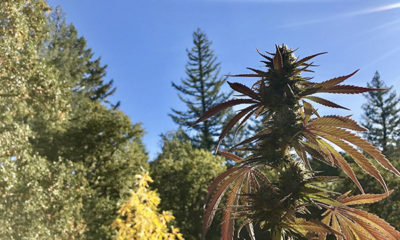Joint Opinions
Christie’s Pot Comments Draw Heckling at Republican Debate
“We want Rand! We want Rand!”
Somewhere near the two-and-a-half hour mark of last week’s Republican presidential debate in South Carolina, protesters supporting Kentucky Senator Rand Paul suddenly interrupted the end of a Chris Christie’s answer in which the New Jersey governor said, “This president doesn’t enforce the marijuana laws in this country because he doesn’t agree with them.”
Over on “political Twitter,” commenters failed to notice the significance of the timing. (Indeed, befuddled Fox Business moderator Neil Cavuto also struggled to understand what was being shouted.) Having been left off the main debate stage for the first time this primary season owing to lack of polling strength among Republican voters, an outraged Paul had chosen not to show up to the “kids table” debate with the Fiorinas and Santorums of the world and instead responded on Twitter throughout the evening. He also appeared on The Daily Show.
Since each contending Democrat supports cannabis reform, the protest on behalf of candidate Paul hangs a lantern on a moment exposing the likeliest way anti-marijuana arguments will further emerge from Republican candidates during this 2016 election year: not necessarily as broadsides against the use of marijuana itself – as most politicians can hear the steady polling drumbeat as well as anyone – but as part of a personal argument against President Obama and his allegedly lawless, whimsical, tyrannical reign.
Ironically, the first time the selective enforcement of federal prohibition laws in legal medical marijuana states was raised with the White House, it was raised from the left regarding immigration. Following an Obama online question-and-answer session hosted by Latino media on Sept. 28, 2011, Press Secretary Jay Carney was asked:
“This afternoon in the online Q&A, the President said, as he has before, when he was asked about deporting people who would otherwise be covered by the DREAM Act, he said he can’t choose which laws on the books to enforce. But a couple of years ago with marijuana he did exactly that. This administration said in states that have medical marijuana laws, federal laws prohibiting marijuana use should not be enforced. So why does the President say he doesn’t have that authority?”
Carney dodged the question, saying he first didn’t understand it and then referring the questioner to the Department of Justice regarding “questions of prosecutorial discretion.”
Conservatives picked up on the critique. Three weeks later, in a BET town hall, Obama took a Mississippi conservative’s question about why the Justice Department had not prosecuted federal marijuana laws whereas it had chosen to file a lawsuit against Arizona over its Senate Bill 1070, otherwise known as the notorious “papers please” law that prompted widespread boycotts and outrage.
Obama did not acknowledge any inconsistency in his positions, instead defending his federal drug enforcement policy, saying the DOJ prioritized drug kingpins over small possession enforcement. Two weeks after that, Carney fielded the same question from the press corps.
“The President argued… you can’t have a patchwork of immigration laws going state to state to state. But what about the logic of whether that applies when it comes to marijuana law, which you have a patchwork of laws, state to state to state?”
Although Carney this time understood the point, and again demurred, the honest answer is that the inconsistency is deliberate, and it’s part of Obama’s political philosophy to want to expand civil rights rather than restrict them. That’s the logical reason why the DOJ’s resources under Obama, with some notable exceptions, go toward fighting restrictions like a law that would require papers-on-demand to prove citizenship rather than toward removing rights from medical marijuana patients in legal states.
If it looks like an inconsistency in applying laws, conservatives hope it can feed a narrative against Obama that he believes himself above the law. Rather than argue against a consciously liberal civil rights philosophy that logically supports what they label inconsistency – given that it’s shared and embraced by enough Americans to lead to two comfortable election wins for Obama – conservatives molded their anti-cannabis argument into a personal one against the President himself: the capriciousness of a lawless scoundrel.
Indeed, a year after Obama was sworn in for his second term, the selective enforcement argument blossomed. The conservative editorial board of the Wall Street Journal, claiming a supposed “growing body of medical research” showing pot permanently damages cognition when adolescents use it, urged Obama to enforce federal laws. “Whatever Mr. Obama’s personal views on marijuana,” concluded the Journal’s conservative editorial board, “his picking and choosing from the U.S. code is far more corrosive to the rule of law and trust in government.”
Seven weeks later, Obama saw the Republican House pass legislation that would force him to crack down on states that had legalized marijuana in any form. The bill went nowhere in the Democratic-controlled Senate of the 113th Congress.
The following summer, two days before the Supreme Court expanded American civil rights when it handed down its landmark Obergefell ruling legalizing same-sex marriage, the personal lawlessness argument bubbled up again when a conservative reporter challenged Press Secretary Josh Earnest–who “vigorously disagree[d]”–over Obama’s failure to enforce federal cannabis laws.
“We have now seen this administration announce publicly that it is going to decline to enforce relevant federal statutes with respect to marijuana… do you understand how a dispassionate observer could conclude that this President who is the chief enforcer of our laws, the chief executive of our laws charged with executing those laws, takes a somewhat cavalier view of the law and sometimes decides it should be enforced and sometimes not?”
All of this is to say that in the polarized political election year of 2016, expect to hear marijuana mentioned from Republican presidential contenders less in the context of legalization’s inherent supposed evils than as evidence of the personal failings of a president Republicans despise. But one way or another, this is Obama’s last year in office, and both major candidates on the Democratic side openly support liberalizing federal cannabis policy. If conservatives’ anti-marijuana focus remains on Obama-as-bad-executive rather than on the changes Hillary Clinton or Bernie Sanders regularly say they will make one calendar year from now, it’s a sign Republicans know prohibition on its merits is not a wedge issue that helps them rise in the polls.
That’s what Christie, personally a staunch prohibitionist, signaled at the Republican debate last week. Though Paul’s vocal supporters may have lost the battle for their particular candidate’s presence on stage, one of Paul’s signature issues is on pace to win the war.
What role do you think cannabis reform will play in the 2016 presidential election? Tell us in the comments below.

























